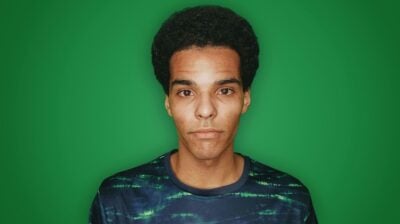We need to get emotional health & resilience on the curriculum
16 year old Roisin thinks we should be taught more about mental health in school
Written by Roisín Mc Ardle
Voices - Opinion
Young people share their point of view.

We talk. That’s what we do, isn’t it? As humans? We talk about tea, what the weather is like, the state of our economy and how long it takes us on average to commute to work. We like to talk. In a way, it makes us feel as though our heads are becoming that little bit lighter, as we offload the thoughts we can’t seem to fathom into constellations. That idea you can’t categorise as good, bad or useless now becomes a shared thought, rather than one you must figure out on your own. It’s pretty amazing when you think about it.
Now imagine for a second that you couldn’t talk. Try as you might the words just won’t come out. What you long to say no matter how big, small or indifferent cannot pass the barrier that is your lips. The different waves of ideas, stories and emotions fall into conflict, and you have a war going on in your own head; but you can’t speak. Why? Simply, you fear no one will listen.
Misconceptions of mental health are as common as the stones in our streets these days. “I’m so depressed today!” is said on the daily by people worldwide. “This test is giving me anxiety”, “I’m so bipolar”, say people using these disorders as names for everyday feelings. Yes, at times we feel anxious, and moody, and sad, but unfortunately we are not educated enough to know that there is a difference between these feelings, and clinical disorders. Arguably, what is deemed essential teaching content in schools is not necessarily an easy thing to decide.
The education system in Ireland focuses heavily on academics, pushing life skills slightly out the window. That’s what we’ve gotten used to, and that’s what we know. But as this generation grow up, and we become the people that make the decisions, isn’t it time that we stand up for our right to be educated on what’s going on in our heads? Kids these days are drawing conclusions on what mental health is, based on the first google search result that comes up on their phone, and if this continues, our generations knowledge on this topic will be well and truly screwed.
Major life events can strike at any time, and we as teenagers are given no guidance as to how to deal with the millions of emotions that are going to run through our heads. We spend years of our lives wrapped up in our academics, in school, blind to the fact that we are not being taught anything about emotions, resilience, or mental health disorders. So how does this happen? How do we take a sensitive subject, make it teachable, and put it on the timetables for students worldwide? How do we end the everlasting stigma that surrounds the word suicide? We start to talk. We start talking about suicide, depression and anxiety the exact same we way that we talk about tea, what the weather is like, the state of our economy and how long it takes us on average to commute to work.
By making this a normal topic of conversation, it starts to creep into people’s minds that maybe, just maybe, there is someone that gets what they’re going through. It is not easy, and to heal the painful scars that go with mental health for many people takes time. But as my dad always used to say, the man who made time, made plenty of it. The next hurdle is getting emotional health and resilience onto the timetable as a school subject. In today’s society where the vast majority of schools are based around iPads, computers and phones, this provides us with the ideal medium to get this message across. We partner up with mental health organisations, the HSE, anybody who knows the facts, figures and solutions that we need to give our country’s young people access to. Create a mandatory online course to be done once a week that focuses on building up mental strength, as well as educating teens on clinical mental disorders. Run a workshop for teachers that they can bring back to their students. Use a class period to focus on mindfulness and meditation. One hour out of a school week is achievable, and we need to stop pretending like that’s too much to ask of ourselves and our government.
As a country, we fall, we make mistakes, we heal and we grow. As any great country does, we learn from our errors. Unfortunately, we need to start learning faster. It is a start, to say our suicide rates are stabilising in this country over the past three years. However it will never be enough to just have “stable” suicide rates. There is no such thing. Our ‘numbers’ need to be at zero. We need to realise that these ‘numbers’ are not just black and white ink on the back of a magazine. These numbers are real people, real lives, and real stories. The pain of seeing someone suffer, let alone to lose someone to such a cause is indescribable, and it is something no teacher, no parent, no friend or no family should ever have to experience. What we as individuals, as communities and as a nation need to do is to stop and say it is okay to talk, and it is absolutely okay to ask for help. This is preventable. THIS IS PREVENTABLE. We can stop the cycle of suicide in Ireland. We can reach out to those suffering, aloud or in silence. We can educate our young people on what they need to know. We can do this. I’ve spoken. The people have shouted. Our nation is screaming. All we need is someone to listen.






